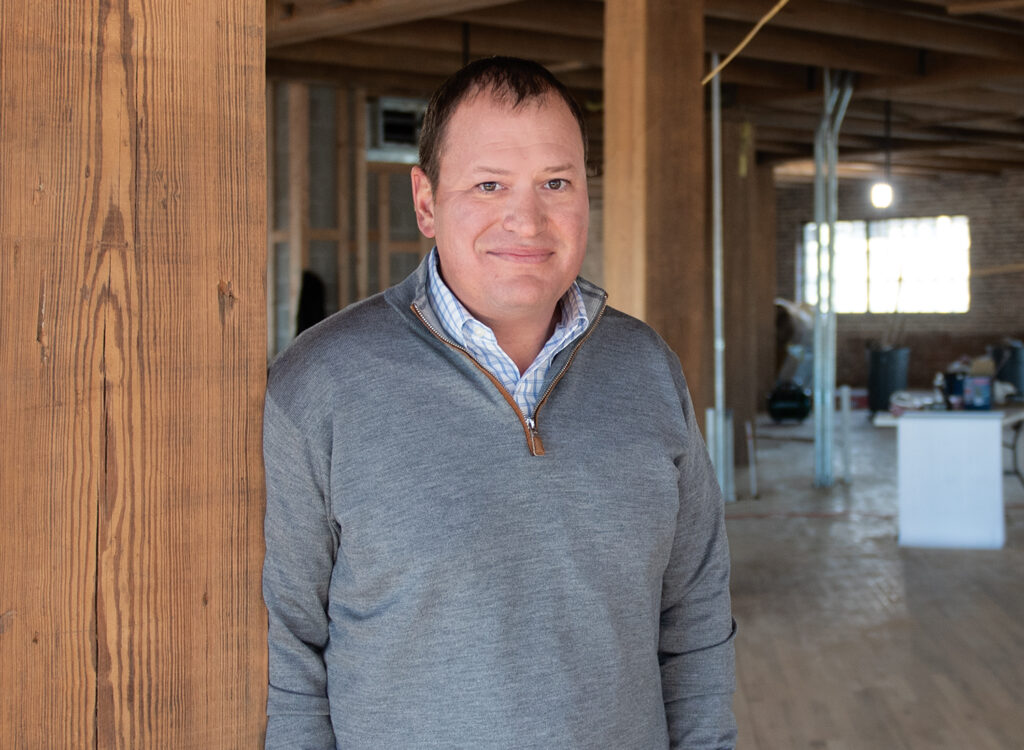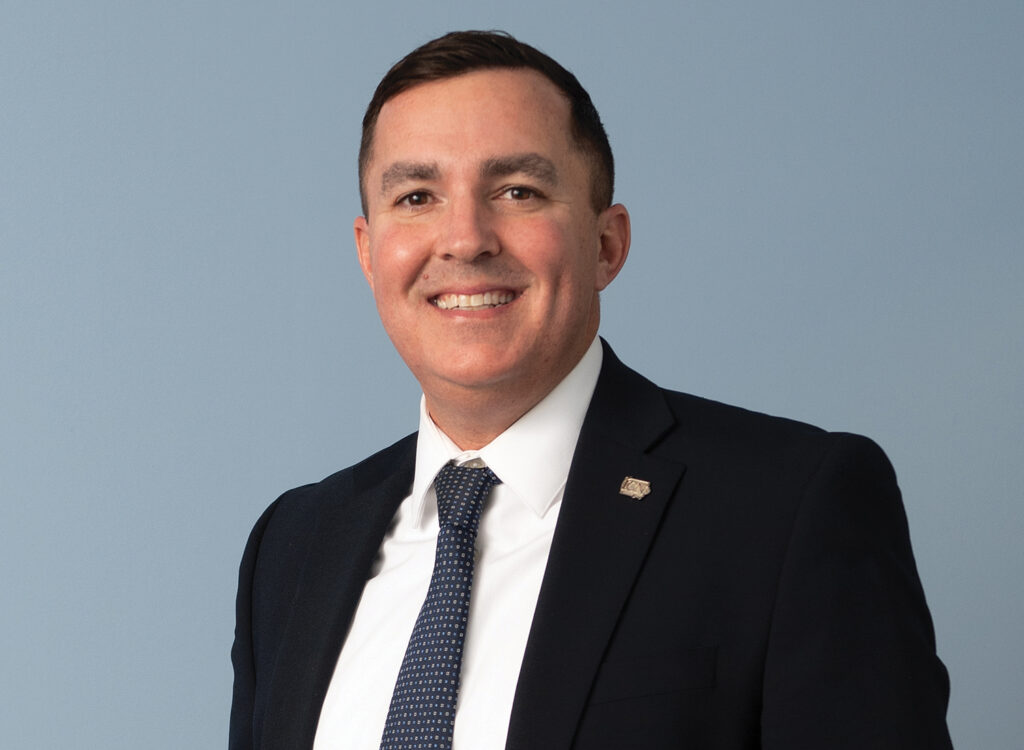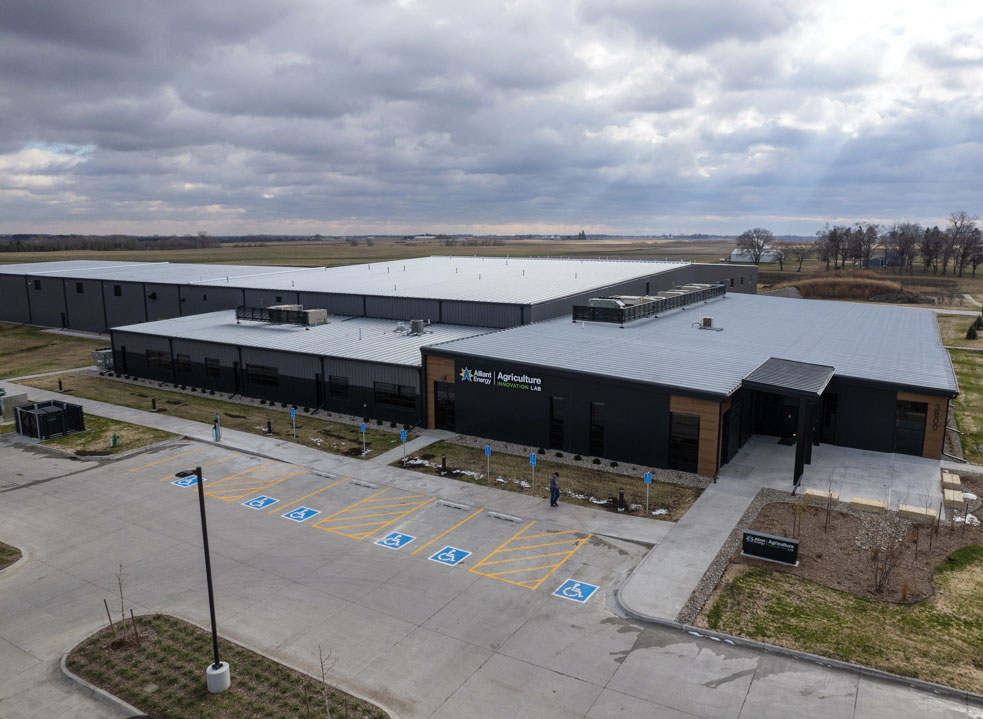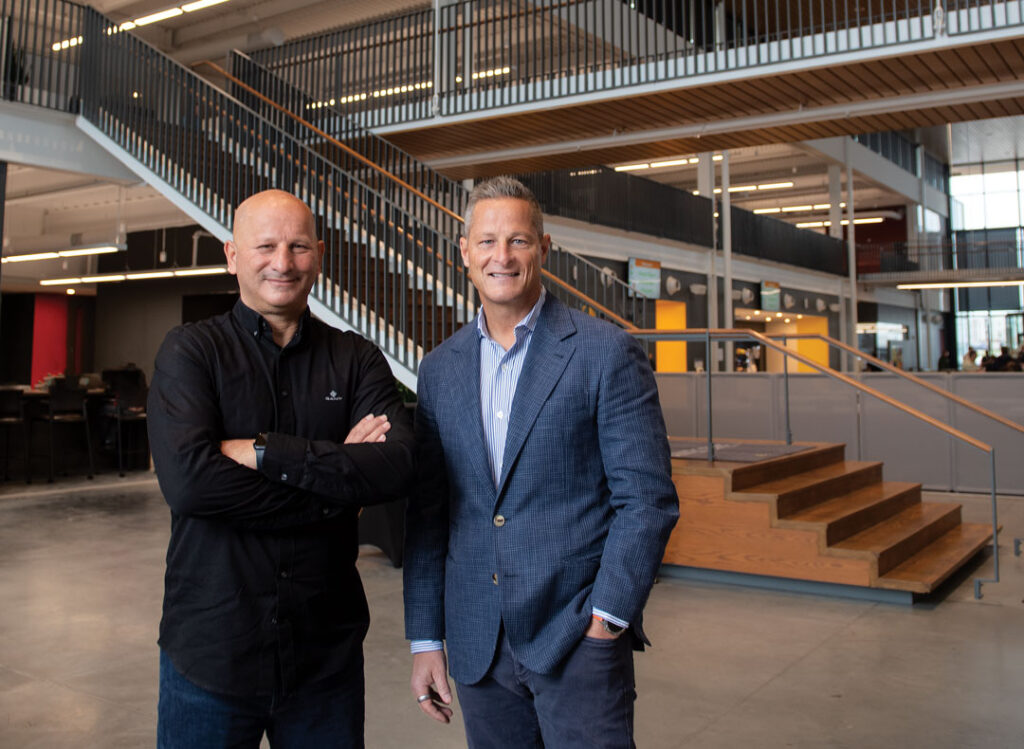Searching for solutions
Water panel leaders describe challenge of uniting diverse interests to cut nitrate pollution

When the Greater Des Moines Partnership leaders wanted leaders for a 90-member task force on water quality issues, they turned to two businessmen who are active in land management and development and have an interest in environmental issues.
Larry James and Steve Bruere freely admit that Des Moines Water Works’ decision to sue three northwestern Iowa counties over nitrate pollution — which drew national attention — is the catalyst for the task force. Their self-imposed mission: come up with the framework of actions the Legislature could take, but not fully detailed bill drafts.
The regulations that Water Works chief Bill Stowe champions to cut nitrate pollution won’t get a second of this panel’s time. James said that’s not because they are a bad idea; it’s just that they would be dead on arrival at the Iowa Legislature, and this group wants action by lawmakers.
James and Bruere both said the main emphasis will be coming up with cash to support the state’s much-praised and much-criticized voluntary Iowa Nutrient Reduction Strategy.
Larry James is a real estate attorney with Faegre Baker Daniels with an emphasis on transactional real estate law. He spends time on his day job working on land development, historic tax credit and low income housing tax credit projects, and multifamily and mixed-use development. He also spends a lot of time working on the future of Des Moines as chairman of Urban Land Institute Iowa, which formed in 2014. That group has been involved in efforts to make Des Moines more friendly to pedestrians and bicyclists, for example.
Steve Bruere, president of Peoples Co., a Clive-based land brokerage and management company, grew up on his family’s corn and soybean farm before he earned a bachelor’s degree in marketing from the University of Northern Iowa.
We sat down with the task force co-chairs to find out more about their approach to one of Iowa’s most important and contentious environmental, economic and political issues.
What is your charge?
Bruere: We weren’t given a charge. Jay (Byers, Greater Des Moines Partnership CEO) asked us to sit down and co-chair this, and really it was up to us what the charge would be.
What do you want it to be?
Bruere: We’re at the point where I think everyone could agree that addressing water quality is something that we need to do in this state. I don’t really think there is debate on whether it’s an ag issue or an urban issue, either.
What needs to be done?
Bruere: I tend to oversimplify things, but I think it’s purely a question of how you address funding for water quality. You can treat water when it leaves the farm, potentially. You can treat water when it leaves the drainage district. Or you can treat water at the water utility.
Depending on where this conversation ends up, it’s how do you finance water quality work at those treatment levels and who pays for it? I hope that after we get through the next 60 days, we develop some creative ideas that maybe folks haven’t thought of yet that address funding.
Generally, people look at the Nutrient Reduction Strategy as a solid, science-based strategy. Most people buy into the strategy itself. The concern is how long it takes to implement, that it’s voluntary, and that there is (not enough) funding to implement it.
There has been talk of some tax credits and other programs. Are you talking about those too?
Bruere: Anything that can be voluntary in nature, that can lead to private investment, is probably the best solution. But you probably need some kind of public money to make that happen.
The Iowa Finance Authority has this beginning farmer tax credit where landowners, if they rent their land to a beginning farmer, receive a state tax credit. There are positive things out there.
Sixty percent of the farmland in Iowa is rented. As I think through this, you know a lot of the fingers get pointed at farmers. To me, this is a bigger absentee landowner issue than it is a farmer issue. I think farmers on rented land are looking at things on a one-year basis. A lot of these programs for sustainable agriculture take a lot longer approach. If you have a one-year lease, it’s hard to think about spending for farming in a sustainable manner.
You have talked in your initial meetings about “four buckets.” What are those?
James: The first one is tax policy. What changes to state tax code or tax credits can we offer that would act as incentives to both landowners and tenants?
Bruere: Or even corporations.
James: The second bucket we talked about is environmental trading. We also had the implementation. How should it be implemented? Who should enforce? What should be the enforcement mechanism? Who does follow-up? Who collects measurable results? Is it going to be (the Iowa Department of Natural Resources)? (The Iowa Department of Agriculture and Land Stewardship)? The watersheds association? The soil conservation districts? It’s clear that what we have going on right now isn’t working.
The fourth bucket is funding.
Is water quality trading part of this?
James: Everything is on the table. Steve and I don’t have all the answers. We are getting people into the room together looking at this issue. Experts in the field from all across this country. Environmentalists, and the agriculture community, and the cities. We’re getting everyone to the table so they can talk face to face. I think we’ll come up with good ideas for potential legislation. They will be ideas that just about everyone can agree on. Not everyone is going to agree, but our job is to come up with something that can be enacted this session and signed by the governor. We will work closely with the legislators and the governor to make sure these are ideas they can support.
Bruere: Let’s say magically $200 million appeared tomorrow. Who is going to implement that? If there are public dollars flowing into a program, it may not be regulation, but you certainly are going to have water quality testing. You certainly are going to have some way to make sure the work is done. If $200 million showed up tomorrow, we couldn’t get the work done right away. It’s going to take up a ramp-up period.
What role did the Water Works lawsuit have, if any, in prompting this discussion.
James: I think I would be lying if I told you we’d be here but for that lawsuit. Whatever you think of the lawsuit, it has moved this issue to the fore. I think that we now are in a situation where it is incumbent upon us to try to come up with a solution that is workable, that helps resolve the matter without litigation.
Being a transactional attorney, I like to avoid litigation. I like to get to an answer that is a fair deal for everybody. It’s the same here. We have a huge agricultural industry in this state, but we also want to have clean water that we can be proud of in this state. Right now, we don’t have that. We don’t have mountains, or oceans, or large forests. We have rivers and some lakes, and unfortunately some of those lakes and rivers are not swimmable, or even fishable. That is something we need to change. That is something that is very much in line with having an economically better state.
Given the large interest in water quality in this state, is there some thought that we might see significant new work to reduce pollution?
Bruere: Conservation and water quality and soil health are not a fad. Ten years ago, when you read articles in farm magazines about somebody doing some of these progressive farming practices, it felt like a fad. It doesn’t feel like a fad today. With the new Nutrient Reduction Strategy two years ago with Iowa State University and Iowa Department of Agriculture and Land Stewardship and Farm Bureau behind that strategy, I think that’s an indication of where people stand on this issue.
Did it help to have the science of Iowa State and others behind the menu of practices in the Nutrient Reduction Strategy?
Bruere: The issue is how do you do it quicker. I think everyone buys into the strategy. The science will get better and the strategy will need to be updated, but today it’s the best we’ve got. If we can figure out a funding mechanism for the Nutrient Reduction Strategy, then we will have been successful.
James: I think what we are saying is we can get the funding behind us to really show progress. That is ultimately what Water Works wants anyway. That board is not interested in just suing people to sue people. They are suing to try to get an outcome. The outcome is cleaner water and lower nitrate levels. If we can show that with increased funding, we’ll get there much faster than we would get there if the lawsuit was “successful.”
Is anyone looking at informal targets or schedules?
James: We don’t know what is going to come out of this. We are not trying to control the discussion. It is an open discussion. We hope we will be able to come to some kind of consensus. Our primary goal is funding the strategy, whether that comes from environmental trading, or from tax credits, public funding or private funding. It’s going to come from a bunch of different sources.
What about deadlines?
James: There are already targets in place, though not time targets. If we can show progress in reducing the nitrate in the waterway, then I think that is getting us farther along than we are now.
Bruere: We are going to come up with some general things, and a lot of this is going to be up to the Legislature.
James: We have to leave it up to the administration to come up with the details.
Bruere: We are about broad strokes and bullet points and big ideas. We aren’t drafting the bills. I think a lot of this stuff is already out there. I ask people on this committee if they individually have the solution. And everybody does. There are a lot of people working behind the scenes at the Legislature and at Farm Bureau.
How are you going to get consensus from 90 people on the task force?
James: We will begin to whittle the ideas down. It’s a lot to get your hands around. Our goal is to have several bullet points or ideas that we can get behind that the Central Iowa business community can present to the Legislature.
Are you going to take a vote of 90 people?
James: I think we are just going to have to talk it out. I think at the end we will have a menu of things to present to the Legislature. We will say that these things are important and very doable.
It’s not a perfect solution, but we are trying to the best of our ability, as volunteers, to put our heads together and figure out ways that we can start addressing this issue that, up to this point, hasn’t been tackled head-on.









